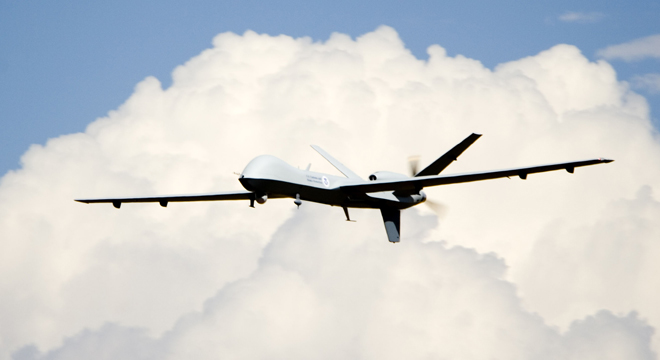A new set of laws will require the FAA to ease up on the rules governing domestic drone use — and to find a way to integrate them into national airspace alongside regular aircraft.
Earlier this week, the Senate passed a bill by a vote of 75-20 that had been fought over in Congress for several years, which appropriates $63.4 billion for the FAA, and, among other things, requires the FAA to loosen restrictions on domestic drone use by September, 2015.
Currently, the FAA has a strict process of licensing agencies to operate Unmanned Aerial Vehicles within the U.S., and limits where they can be flown for safety reasons. Primarily, the unarmed UAVs are being used by some law enforcement agencies for surveillance and emergency situations.
The FAA was already planning to issue new, looser standards for issuing the licenses in the next couple of months, but the bill sets a hard deadline for those rules to be finished within 90 days.
But the legislation also requires the FAA to expand the list of who can operate the drones, and where and when they can be flown. “A government public safety agency” will be able to operate drones of a certain size as long as certain safety conditions are met. And the FAA is now required “to safely accelerate the integration of civil unmanned aircraft systems into the national airspace system.”
The ACLU, which has recently sued the government for records on predator drone strikes targeting U.S. citizens overseas, is wary of the bill’s provisions that will allow the UAVs to have more access to national airspace.
Jay Stanley, who co-wrote a recent ACLU report on domestic drone use, told TPM that the legislation will “clear the way for much more deployment of drones, domestic surveillance drones, than we’ve ever seen before.” Stanley said that in the next five years “we’re going to have to confront the reality of these as a routine part of policing,” and that
there need to be “ground rules to ensure that our privacy doesn’t take a big hit.”
For example, he said, police should have to limit using the drones in places where they have reason to believe they can collect evidence “related to wrongdoing,” for a specific emergency situation, or for non-law enforcement purposes, like geology. There also need to be guidelines in place for how police handle “image retention protections” when the drones snap recognizable pictures of people.
Stanley said that current drone use is just what he calls “procurement policy-making,” where “new technology that has implications for privacy or civil liberties is just adopted by the police because they get grants from” the government.
Though Stanley said there have so far not been any specific instances of a drone violating someone’s civil liberties — the closest being when a sheriff in North Dakota borrowed a predator drone from a local military base to avoid a standoff with a family of sovereign citizens — “I think that it’s inevitable.”
The federal government is also facing a lawsuit from the Electronic Frontier Foundation, a watchdog group that is asking for the FAA to release records on the almost-300 agencies that have authorization to operate drones domestically. Jennifer Lynch, an attorney with the EFF who brought the case, told TPM that this bill makes their suit even more important. “I think the fact that Congress is pressuring the FAA to expand its UAS program through the FAA Reauthorization Act only reinforces the need for these records,” Lynch said. “It’s important that we learn more about how the federal government and state and local law enforcement agencies are already using UASs before we expand their use further. The privacy concerns posed by the use of drones for domestic surveillance are too great to excuse the FAA’s lack of transparency on this issue.”
The House signed the bill on Friday, and it will now go to President Obama who is expected to sign it despite an earlier threat that he would veto it over a provision about organized labor. “While it is unfortunate that Republicans in Congress have injected extraneous ideological measures into this important legislation that will create jobs and improve air traffic safety,” a White House official told TPM in an e-mail, “the provision referenced in our veto threat has been removed and the President will sign the compromise bill.”









